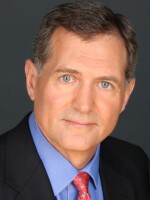ARI SHAPIRO, HOST:
By law, the director of national intelligence must have, quote, "extensive national security expertise." Past directors have been ambassadors, admirals and military intelligence officers. The departing DNI, Dan Coats, also fits that description.
AUDIE CORNISH, HOST:
The man President Trump wants to replace Coats, however, does not. Texas Congressman John Ratcliffe is a big backer of the president. NPR's Greg Myre kicks off our coverage.
GREG MYRE, BYLINE: John Ratcliffe has been a lawyer, a prosecutor, a mayor and a Republican congressman, but he's never had a job in the intelligence community. And President Trump wants Ratcliffe to be the director of national intelligence, overseeing 17 separate agencies from the CIA to the NSA to the FBI. David Priess is a former CIA officer.
DAVID PRIESS: This could be a tricky confirmation hearing because we don't have that track record of working with top secret intelligence on a regular basis. He's been a member of the intelligence committee in the House for seven months.
MYRE: Priess notes that past directors of National Intelligence had considerable experience in intelligence, the military or as diplomats - not so with Ratcliffe.
PRIESS: That's not to say anything about his ability to manage, but it certainly does show a sharp contrast with the resumes of all of those who have gone before him.
MYRE: The 53-year-old Ratcliffe has been based in Texas throughout his career. He served eight years as the mayor of Heath, a wealthy town of 9,000 east of Dallas. He's been ranked as one of the most conservative members of Congress since he was elected in 2014. He staunchly supports the president and harshly criticizes Democrats for the way they've handled Robert Mueller's investigation, including his testimony last week. Here he is on "Fox News Sunday."
(SOUNDBITE OF TV SHOW, "FOX NEWS SUNDAY")
JOHN RATCLIFFE: They overplayed their hand, and they did it in front of the American people on a national television audience. It was just a train wreck of a week for the Democrats. It was a great week for Donald Trump because of that.
MYRE: If Ratcliffe is nominated and confirmed, he would replace Dan Coats, who often contradicted the president with his assessments on Russia, North Korea and Iran. Vince Houghton, who writes about the intelligence community and is the historian at the International Spy Museum, says Coats deserves high marks for speaking out when he knew it would anger Trump. But Houghton says just telling the truth is not enough if the message isn't getting through.
VINCE HOUGHTON: I don't care how good you are at presenting accurate information to your primary consumer. If your primary consumer is ignoring you and not willing to listen to the conclusion of the intelligence community, then the job is not being done.
MYRE: The job was created in the wake of the 2001 al-Qaida attacks in order to have a senior official coordinating among all the intelligence agencies. Some critics say the job has never been well-defined and has not had the impact that was intended, but David Priess thinks it's still important.
PRIESS: We've had plenty of presidents who listened to their directors of central intelligence or, in more recent years, directors of national intelligence. Even if they didn't like what they were hearing, they would take that phone call, and they would keep inviting them back.
MYRE: Ratcliffe hasn't said much about intelligence matters. He did garner attention last week by accusing Robert Mueller of exceeding his authority in his investigation of the president.
(SOUNDBITE OF ARCHIVED RECORDING)
RATCLIFFE: I agree with the chairman this morning when he said Donald Trump is not above the law - he's not. But he damn sure shouldn't be below the law, which is where Volume 2 of this report puts him.
MYRE: As director of national intelligence, Ratcliffe would be responsible for telling the president about any threats to the 2020 election.
Greg Myre, NPR News, Washington. Transcript provided by NPR, Copyright NPR.


